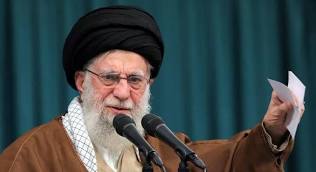During a meeting with Air Force officers and personnel in Teheran Khamenei elaborated on the issue of negotiation with the US. The text of the speech is available here (in Farsi): https://farsi.khamenei.ir/news-content?id=59269.
A lot has been written about the message that Khamenei intended to project on the (at home) controversial issue of negotiating with the US and different interpretations have been provided depending on the observer.
Iran International, the channel accused by Iran of being funded and supported by Saudi Arabia, which is usually promoting anti Iran narrative, publishes its report with the headline: “Khamenei rejects US talks in setback to Trump hopes for a nuclear deal” (Khamenei rejects US talks in setback to Trump hopes for a nuclear deal | Iran International) implying that the SL closed the door to the talks, dashing Trump’s hopes for a deal.
The wording used by Khamenei is indeed direct and unambiguous: “Negotiating with such a government should not be done; it is neither wise, intelligent nor honorable”. In one section of the speech, he says Iran is going to respond in kind to every step US would take against its interests: “If they threaten us, we will threaten them. If they act on those threats, we will do the same. If they undermine our nation’s security, we will undoubtedly respond in kind”. A tit for tat strategy, aimed at projecting an image of strength, highlighting that Iran does not intend to negotiate (eventually) from a position of weakness, an assumption widely circulating in the west.
Khamenei appears to remove the nuclear talks from the attention of the iranian public opinion as the most urgent and pressing issue by adding that they, in any case, will not solve the problems of the Country: “Negotiations with the United States have no impact on solving the country’s problems. We must understand this correctly and not be misled into thinking that sitting at the negotiation table with that government will resolve certain issues. No, negotiations with the United States will not solve any problems”.
This part of the speech is seen as an attempt to downplay the importance of an issue (the talks with the US) which has been central in recent days in the iranian public debate, with mixed messages and reactions from the various political groups, from the reformists to the hardliners and ultra-conservatives.
Moreover, Khamenei adds, the past experience with the nuclear talks does not bode well for the future either: “Our government of the day met with them, went back and forth, negotiated, laughed, shook hands, and acted as a friend, and a treaty was formed in which the Iranian side generously gave many concessions to the other side, but the Americans did not comply with that treaty”.
For Khamenei the US does not deserve any trust “The United States violated the same treaty despite its shortcomings and withdrew from it”. In parallel, the Europeans are also untrustworthy. He mentions indeed negotiations with “several other Countries” a likely reference to the E3, another failed experience in the last years.
Even though at first reading the message Khamenei is sending appears along the lines described by Iran International and other outlets, inside Iran analysts give a different, more nuanced reading of his speech. They highlight that Khamenei’s message was aimed at removing the impression in the west that Iran “desperately” needs negotiations. According to this reading, the speech was a “forced reaction” to Trump’s signing the return of the maximum pressure policy. Teheran was in a way forced to clarify that it will not negotiate, eventually, from a position of weakness. This, they argue, does not mean that taks with US will be removed from the agenda.
As western observers argue: “Khamenei’s reservations do not close the door to negotiations as he has stated on many occasions in the past that US should not be trusted”. They believe Khamenei, before giving the green light to the talks, prefers to wait some time to better understand what the US can put on the table.
Sources in Teheran explained to the author that the speech could be interpreted as kind of “fine tuning” between Teheran and Washington after the rumored first contacts behind the scenes, necessary to project a message of strength to the iranian public opinion following the recent debacle of the axis of the resistance at regional level. However, they add that it should not be interpreted as a backtrack on nuclear talks.
Time will tell if this assumption is realistic.
